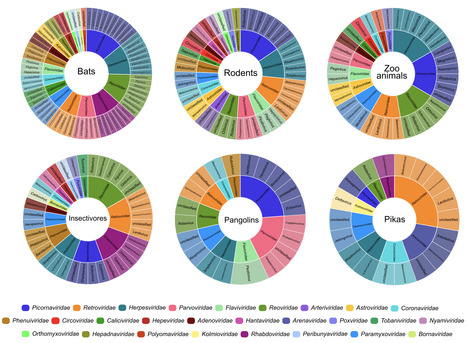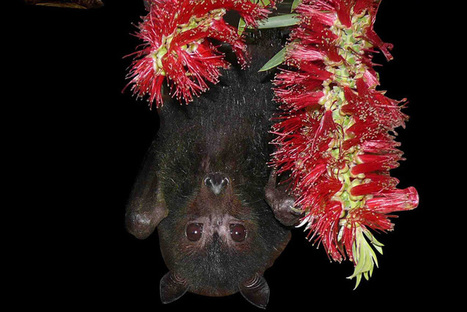Wildlife is reservoir of emerging viruses. Here we identified 27 families of mammalian viruses from 1981 wild animals and 194 zoo animals collected from south China between 2015 and 2022, isolated and characterized the pathogenicity of eight viruses. Bats harbor high diversity of coronaviruses, picornaviruses and astroviruses, and a potentially novel genus of Bornaviridae. In addition to the reported SARSr-CoV-2 and HKU4-CoV-like viruses, picornavirus and respiroviruses also likely circulate between bats and pangolins. Pikas harbor a new clade of Embecovirus and a new genus of arenaviruses. Further, the potential cross-species transmission of RNA viruses (paramyxovirus and astrovirus) and DNA viruses (pseudorabies virus, porcine circovirus 2, porcine circovirus 3 and parvovirus) between wildlife and domestic animals was identified, complicating wildlife protection and the prevention and control of these diseases in domestic animals. This study provides a nuanced view of the frequency of host-jumping events, as well as assessments of zoonotic risk. Monitoring the diversity of viruses infecting animals is important for assessing zoonotic risk. Here, the authors use metatranscriptomics to characterise the viromes of small mammals, pangolins, and zoo animals in China to identify potentially zoonotic viruses.
Published in Nature Comm. (April 29, 2023):



 Your new post is loading...
Your new post is loading...










Buy Pethidine online
Price: $190.0 – $480.0Buy Prozac Online
Price: $100.0 – $250.0buy PURE WHEY PROTEIN online
Buy quaaludes online
Buy quality Ativan online
Buy quality methadone online
Price: $150.0 – $900.0Buy quality vyvanse online
Price: $200.0 – $450.0Buy sibelium online
Price: $150.0 – $250.0buy Sodium valproate
buy suboxone strips online
Price: $160.0 – $500.0Buy Subutex Online
Price: $180.0 – $450.0Buy to quality roxicodone Online
Price: $240.0 – $600.0Buy TOP QUALITY Suboxone Online
Price: $150.0 – $500.0Buy Ultram Online
Price: $100.0 – $400.0Buy vicodin online
Price: $150.0 – $500.0Buy vicoprofen online